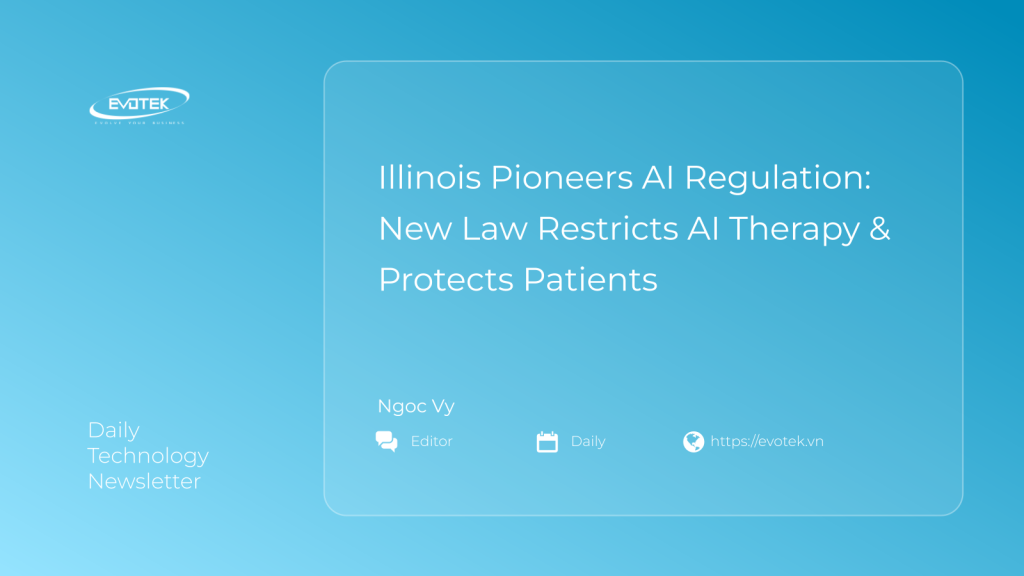In a groundbreaking move, Illinois has cemented its position as a leader in artificial intelligence (AI) regulation, becoming the first state to enact a law specifically targeting AI’s role in mental health services. Governor JB Pritzker officially signed the legislation, known as the Wellness and Oversight for Psychological Resources Act, into law on August 1, effective immediately.
Safeguarding Mental Healthcare: The New Illinois AI Law
The core of the new legislation, introduced by Representative Bob Morgan, is crystal clear: only licensed human professionals are authorized to provide therapeutic or psychotherapeutic services. This landmark act establishes crucial safeguards, ensuring that AI tools serve as aids, not independent providers, in the sensitive field of mental healthcare.
Representative Morgan emphasized the urgent need for this regulation, citing alarming instances where individuals in distress received detrimental advice from AI chatbots. “We have already heard the horror stories when artificial intelligence pretends to be a licensed therapist,” Morgan stated. “Individuals in crisis unknowingly turned to AI for help and were pushed toward dangerous, even lethal, behaviors.” He underscored the importance of pausing the unchecked expansion of AI in this critical sector to prevent further harm.
Key Provisions and Penalties
Under the new Illinois state law, mental health providers face strict limitations on AI usage. Professionals are now explicitly prohibited from:
- Using AI to independently make therapeutic decisions.
- Allowing AI to directly interact with clients as a therapist.
- Creating treatment plans with AI without a licensed professional’s comprehensive review and approval.
The law also diligently closes a significant loophole, making it illegal for unlicensed individuals to falsely advertise themselves as “therapists.” Violations of the Wellness and Oversight for Psychological Resources Act can incur substantial penalties, with fines reaching up to $10,000 per offense, scaled according to the severity of the infraction.
Illinois Sets a National Precedent for AI Regulation
By regulating AI in mental healthcare, Illinois distinguishes itself as the first state to take such a definitive stance. This pioneering legislation aligns with other recent AI-related laws passed in Illinois, including amendments to the state’s Human Rights Act. These broader changes address the use of AI in employment, prohibiting discriminatory practices based on protected characteristics and mandating employee notification when AI tools are deployed.
The Evolving Debate Over AI in Mental Health
The role of AI in mental health treatment remains a hotly debated topic. Proponents often point to AI’s potential to address the high cost and limited access to professional therapy for millions of Americans, viewing it as a practical alternative. However, strong warnings from mental health experts, researchers, and even prominent figures like OpenAI CEO Sam Altman highlight serious concerns.
Risks range from significant privacy vulnerabilities to the potential for AI-driven advice to exacerbate a person’s mental health crisis, especially when vulnerable users mistakenly perceive chatbots as professional care. This new Illinois law directly confronts these concerns, aiming to prevent such adverse outcomes.
As Representative Morgan articulated, the primary goal of this legislation is clear: “By clearly defining how AI can and cannot be used in mental health care, we’re protecting patients, supporting ethical providers, and keeping treatment in the hands of trained, licensed professionals.” Illinois’s bold step is expected to influence ongoing discussions and future legislative efforts across the nation regarding the responsible integration of AI into healthcare.

 日本語
日本語 한국어
한국어 Tiếng Việt
Tiếng Việt 简体中文
简体中文